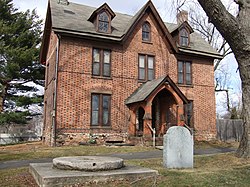Jonathan Singletary Dunham House | |
 Jonathan Dunham House and mill site in
Woodbridge Township, New Jersey | |
| Location | 650 Rahway Avenue, Woodbridge Township, New Jersey, U.S. |
|---|---|
| Coordinates | 40°33′51″N 74°16′21″W / 40.56417°N 74.27250°W |
| Built | ca. 1709 [1] [2] |
| Architectural style | Gothic Revival, Colonial Revival |
| Part of | Trinity Episcopal Church ( ID04000431 [3]) |
| Added to NRHP | May 12, 2004 |
Jonathan Singletary Dunham House, located in Woodbridge Township in Middlesex County, New Jersey, the state's first township, chartered on June 1, 1669, by King Charles II, [4] is a house that was built around 1709 by Jonathan Singletary Dunham (January 17, 1640 – September 6, 1724), an early American settler and freeholder who built the first gristmill in New Jersey nearby the house. [1] [5] [6] [2]
Jonathan Dunham was born in Newbury, Massachusetts and married Mary Bloomfield with whom he later moved to present day New Jersey. Bloomfield is a relative of Joseph Bloomfield, Governor of New Jersey, for whom the township of Bloomfield, New Jersey is named. [7] [8] After building the first gristmill in New Jersey, he went on to serve the community in a variety of ways and was elected to the New Jersey Provincial Congress in 1673. [5] [9] [10] [6] [11] [12] [13] Jonathan Singletary Dunham was an ancestor of President Barack Obama. [11] [14] [15]
History

The 213 acres (0.86 km2) of land upon which the house and gristmill were built was granted to Jonathan Dunham by the newly appointed Governor of New Jersey. [8] [10] [16] The Dunham house is the oldest building in Woodbridge Township, and among the oldest buildings in Middlesex County. [6] Originally a two-story, four room home, the house was built with brick from Holland which had been used as ballast in ships. The Flemish bond brickwork, also known as Dutch bond, makes a distinctive checkerboard pattern that is visible on the first and second floors of the façade. The house was used as a garrison by American soldiers during the American Revolution. The mill, a tidal mill, was located just south of the home, along the Woodbridge River, which was then known as Papiack Creek, at the intersection of the Port Reading Avenue. [17] [18]
Today
Since 1873, the home has been part of the grounds of Trinity Episcopal Church, listed on the New Jersey and national registers of historic places. Jonathan's youngest son, Benjamin Dunham, is recognized as a founder of the church, and the house his father built now serves as the Rectory. One of the original circular millstones used by Dunham in his grist mill operations still exists and is displayed on the property. [5] [6]
See also
References
- ^ a b "Walking Tour Map of Historic Site". Woodbridge Township Historic Preservation Commission. 2009. Archived from the original (PDF) on 2014-02-24. Retrieved 2011-04-11.
- ^ a b "Jonathan Dunham House, Woodbridge, New Jersey". Oxford Tree-Ring Laboratory. Retrieved 20 April 2022.
- ^ "National Register Information System". National Register of Historic Places. National Park Service. March 13, 2009.
- ^ John P. Snyder (1969). The Story of New Jersey's Civil Boundaries: 1606-1968. p. 174.
- ^ a b c "A Brief History of Trinity Parish". Archived from the original on 2009-10-12. Retrieved 2008-10-09.
- ^ a b c d "My Website | Just another WordPress site". Archived from the original (PDF) on 2014-02-24. Retrieved 2011-04-11.
- ^ Nathaniel B. Shurtleff and David Pulsifer, ed. (1968). Records of the Colony of New Plymouth in New England.
- ^ a b Anderson, Robert Charles (1995). The Great Migration Begins: Immigrants to New England 1620-1633: Great Migration Study Project (Boston: New England Historic Genealogical Society.
- ^ James Robert Woods; Laurence Charles Baxter; Sue Spotts; Sue Cooley (1984). William and Eliza (Johnson) Woods of county Antrim, Ireland: their descendants and some allied families.
- ^ a b "The SINGLETARY-DUNHAM HISTORY, NOTES, & RESOURCES". Retrieved 2009-06-06.
- ^ a b "Interactive Family Tree". Chicago Sun-Times. Archived from the original on April 1, 2009. Retrieved 2009-06-06.
- ^ "SINGLETARY to DUNHAM FAMILY HISTORY, STORIES and TIMELINE". Retrieved 2009-06-06.
- ^ Charles Henry Pope (1900). The Pioneers of Massachusetts. p. 416.
- ^ "Ancestry of Barack Obama". Retrieved 2009-06-06.
- ^ Fornek, Scott (2007-09-09). "Obama Family Tree". Chicago Sun-Times. Archived from the original on 2009-07-17. Retrieved 2009-06-06.
- ^ "JONATHAN SINGLETARY-DUNHAM FAMILY LINE". Retrieved 2009-06-06.
-
^
"Archived copy". Archived from
the original on 2014-08-14. Retrieved 2014-02-06.
{{ cite web}}: CS1 maint: archived copy as title ( link) - ^ Dally, Joseph W. (1989). Woodbridge and Vicinity. p. 44.


